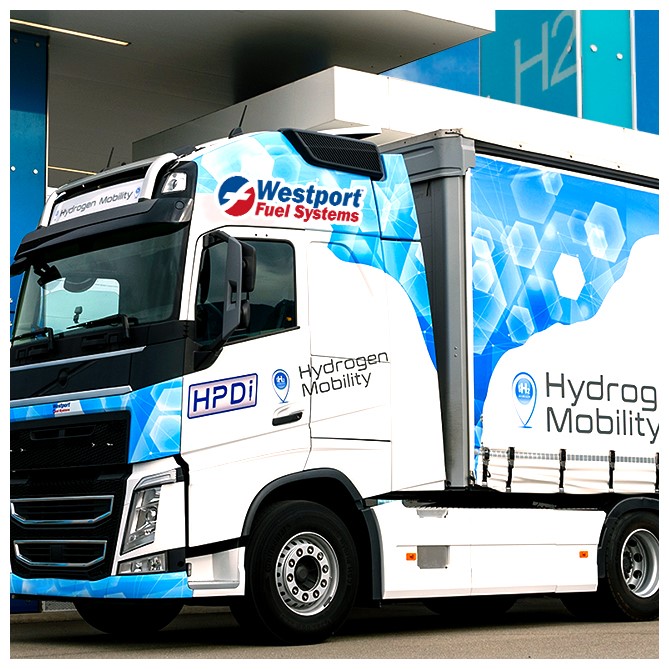Westport Unveils H2 HPDI™ Fuel System for Sustainable Hydrogen Internal Combustion Mobility
Westport’s HPDI fuel system allows heavy-duty trucks to deliver power and torque
while dramatically reducing CO2 emissions
Westport Fuel Systems Inc. announced its new H2HPDI fuel system. For the first time in Europe, Westport will display its H2HPDI fuel system-equipped demonstrator truck at IAA Transportation 2022 in Hanover, Germany, September 20-25, 2022. Further information will be available at the Westport booth, Hall H12 Stand B70.
H2 HPDI is designed for use in internal combustion engines. The system, when fueled with hydrogen, offers more power and torque than diesel while dramatically reducing emissions. Westport’s H2 HPDI fuel system provides the following benefits:
- Up to 20 percent more power than diesel
- Up to 18 percent more torque than diesel
- Near zero CO2 emissions
- Preserves existing diesel engine architecture
- Preserves existing engine manufacturing infrastructure and investment
- Lowest cost to achieve CO2 compliance
“We unveil today to the European audience a new CO2 reduction solution for heavy-duty transport. Westport’s H2 HPDI™ fuel system powering an internal combustion engine turns innovation into answers, creating sustainability we are very proud of,” said David Johnson, CEO, Westport Fuel Systems. “We like to think of it as a game changer without the change. Our technology achieves better performance than diesel engines, with Near Zero CO2 emissions, all while utilizing existing manufacturing capital investment and infrastructure.”
Decarbonizing Europe
The European Union has set a 2050 deadline to achieve its goal of becoming carbon neutral, and hydrogen fuel in the heavy-duty vehicle sector is expected to play a substantial role in this decarbonization strategy. According to European Commission data, about 20 percent of the future overall transport fuel mix will be from H2 with an additional 20 percent composed of low-carbon synthetic fuels derived from H2.
Westport’s H2 HPDI fuel system offers a cost-effective solution that delivers near-zero CO2 emissions. OEMs will be able to continue using existing internal combustion engines by powering them with hydrogen, thus leveraging their investment in vehicle drivetrain design, supply chain and manufacturing. Engines equipped with this fuel system provide superior performance as compared to spark ignited H2 ICE systems and diesel engines, including greater efficiency and power density as well as lower operating cost. On a heavy-duty cycle, the H2 HPDI fuel system is anticipated to meet or exceed the performance and efficiency delivered by fuel cells.
Lower Investment, Better Performance: Game Changer, Without the Change
H2 HPDI utilizes existing manufacturing infrastructure, a key factor in the near-term adoption of sustainability solutions. Minimizing public and private investment on the path towards decarbonization is a key component of Westport’s ability to achieve real change quickly. This allows OEMs to make a big shift in their offering, a win-win for the industry and the environment.
HPDI Already Performing on the Roads
Westport’s mission is driving innovation to power a cleaner tomorrow. The hydrogen-powered H2 HPDI achieves greater performance improvements leveraging Westport’s experience with its LNG HPDI fuel system, on the road today.
Westport’s LNG HPDI fuel system offers OEMs the flexibility to easily differentiate their natural gas and biogas product lines while maintaining full commonality with conventional engines and powertrain lines. An LNG HPDI fuel system-equipped engine, fueled with a blend of 60 percent natural gas including 40 percent biogas, delivers the same life cycle CO2 reductions as fuel cells using blue/green hydrogen blends. It can also deliver net zero well-to-wheels CO2 emissions, with 100 percent biogas, which is becoming the predominant fuel for LNG trucks in many parts of Europe.
Category: Electric Vehicles, Engines & Drivetrains, Equipment, Featured, Fuel & Oil, General Update, Green, Management, News, Products, Tech Talk, Vehicles











